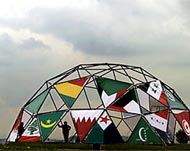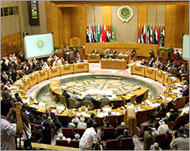We can wait no longer
Reform is imperative. It cannot be bypassed or delayed any longer.

In the Arab world, it is already overdue. The middle class has been decimated and poverty is widespread, while security-obsessed states have grown stronger at the expense of civil-society institutions.
Reform is required as vindication of a brilliant past, when the Arab community had its own culture marked by innovation and accommodation of the other.
This was a reflection of Islam, which had released both the community’s and the individual’s potential for creativity, reform and change.
Widespread authoritarianism
Reform also serves as recognition of the present and as an outline for the future where a well-considered reconciliation between Western modernity and the thinking embraced by most schools of contemporary political Islam is forged.
These schools have their own notions and methods as regards democratic reform and the need to push it through. However, political authoritarianism has established itself as a ubiquitous phenomenon.
Any attempt to challenge it from within society is met with exclusion through repression. External challenges face political rejection and popular resentment.
Listening skills
This is so despite the fact that reform is essentially an endeavour to widen the margin of shura – consultation – freedom, democracy and political participation as adopted in the theory and practice of Islam.
Reform involves economic development which promotes social mobility in the interests of renewal and advancement. This would create a cultural and political environment conducive to tolerance and hope.
In this perspective, reform is sought by generations that feel betrayed by political regimes determined to shun reform with flimsy excuses and a lopsided logic that says reform should be made step by step.
|
Reform is sought by generations that feel betrayed by political regimes |
In reality, political dogmatism, predominant in the Arab world, and a lack of participation in state decision-making, refutes this argument.
The other argument against an overall initiative is based on the claim that each state has its own conditions, political system and internal circumstances.
Accordingly, reform must come from within as its makers will be better equipped to deal with peculiar conditions.
The real meaning of phrases such as “internal circumstances” or “from within” need to be cleared up.
Cultural identity
They can refer to the regimes, political communities and civil society, which by no means have identical interests, tendencies or purposes. This is backed up by a proposition centred on cultural specificity and identity.
 |
|
Most Arabs are forced to live in |
The whole package is then delivered in a messianic discourse assigning to the “elites” the task of selling it to the Arab public.
To be sure, the common denominator between the Arab regimes is that they run a police state rotten to the core whose sole concern is to ward off such overdue political demands as democracy, human and civil rights.
In this context, any talk about specificity and identity is meaningless when people live in poverty and are viewed with suspicion even for their silence.
It is as though Arab peoples’ specificity is ingrained in despotism and such values as freedom and democracy are its antithesis. This, in fact, is diametrically opposed to the principles of Islam that guarantee human rights and freedom.
Validating the regimes
There are those who say that existing reform initiatives are flawed in terms of vision and diagnosis; they say launching initiatives without presenting reforms first to the Arab rulers, who might delete and amend what they deem unsuitable, is unwise.
Thus, the argument goes, reform initiatives would threaten the entire political edifice and consequently undermine stability; “extremist” forces and opposition parties that have no inkling of statesmanship would take over.
They say such forces are ostensibly dissenting out of jealousy over the privileges that go with huge wealth; once they are in power they will only bring about political and social disorder.
|
Thus, the argument goes, reform would threaten the entire political edifice and consequently undermine stability |
The implicit goal is to discredit reform initiatives. These are simply futile attempts to perpetuate a form of government that is both despotic and patrimonial.
The regimes in question have failed in the management of a peaceful political life, in their promise of development, in modernising their own state structure and institutions and in respecting the very constitutions drafted by them.
Yet, they give themselves the right to act as representatives and trustees of the Arab people, to decide on their behalf what they consider to be good for the people in every sphere of their lives.
To differ is sedition. Being the only choice available, and holding all the power in their hands, obedience to the ruling elite is a duty. They afford themselves all this even though they lack such criteria of legitimacy as consensus as known in Islam.
Various interpretations
Political leaders and sections of the public see an immediate solution to the Palestinian problem and any reform plan as inseparable.
Here, reform is rejected for two reasons: First, because the US is proposing an initiative in this direction – as if this is a good enough pretext to balk at changing a decadent political state of affairs.
Second, because reform is rejected by those who have suppressed all rights except their own right to reproduce despotism.
The irony is that reforming the structures of government that have caused the present crisis in state and society is portrayed here as an obstacle to resolving the Palestinian problem.
 |
|
The last Arab League summit in |
There are those who call for stopping the Arab people’s deteriorating condition – a result of the cumulative impact of misrule – by other means than those based on the existing regimes’ own logic.
Arab governments convene meetings where plans to reform the Arab League are scrapped because of inter-Arab squabbling.
The international community says it wants internal reform; the Arab peoples are yearning to see their economic and political conditions reformed; but the existing regimes are aborting such aspirations.
This absurd spectacle finds expression in the regimes’ own discourse. They are reportedly interested in mending inter-Arab fences.
The priority, however, is not about replacing controversial clauses in the Arab League statutes and then cheering any compromise settlement as the ultimate goal.
What is needed
What is needed are specific political and legal measures within a set time limit so that the demand for democratic reform does not lose its momentum in the face of the public call to reject external initiatives on the grounds that they encroach on national sovereignty.
A primary task of any reform project is to immediately engage the Arab people in the process of political modernisation.
However, the requirements and conditions for this modernisation process should be fulfilled starting with an objective analysis of the social as well as political structures. A content analysis of the dominant discourse and practice is equally needed.
Historical impediments to attaining a pluralist culture should be identified.
 |
|
Arab regimes are under pressure |
Political measures are necessary for democracy, as is identifying the social conditions necessary for Arab civil society to overcome the weakness of its institutions in order to spearhead peaceful transformation to democracy.
Another important element is a sense of historical responsibility and political earnestness as regards the political community, the political system and the ruler.
Although historical events are made by a combination of objective conditions, the subjective factor still plays a role in speeding up events.
Popular support
One advantage of the reform initiatives being proposed is their popularity in the Arab street. This may put pressure on Arab regimes and prompt them to put forward their own plans under the scrutiny of the international community and its organisations.
Moreover, such initiatives would show the authoritarian regimes that they are in a historical predicament that can no longer be evaded by shifting it to society and state in the form of a permanent crisis.
It is becoming evident that any initiative would corner the regimes and give vent to the indignation felt by Arab societies in deep crisis.
In this duel, where the battle lines are being drawn between Arab regimes and the international community, any loss sustained by the regimes is a gain to public freedoms in Arab societies.
Dr Amir Al-Naffakh is a professor of Islamic philosophy at Baghdad University.